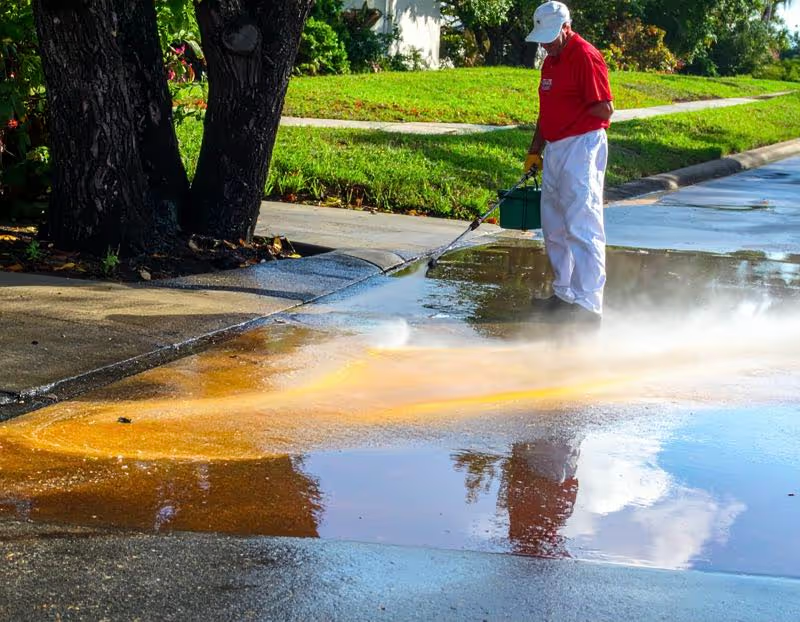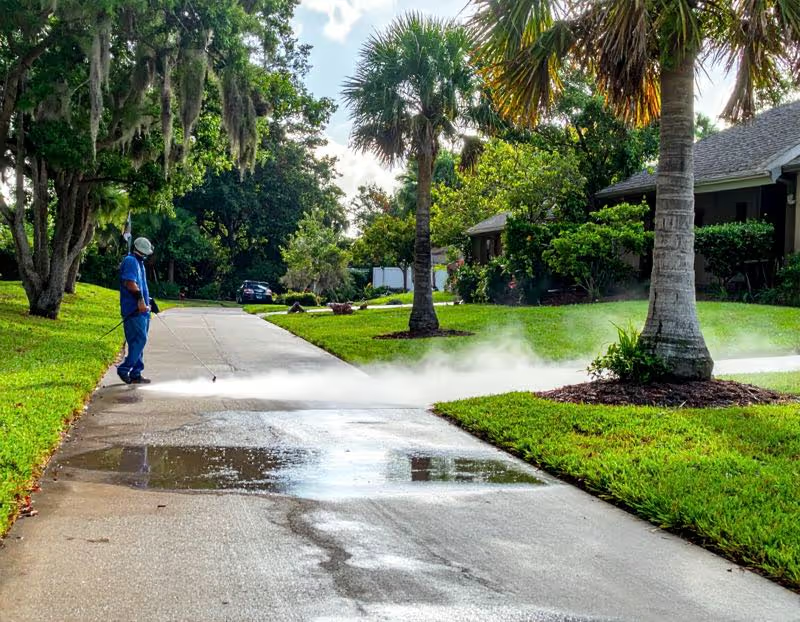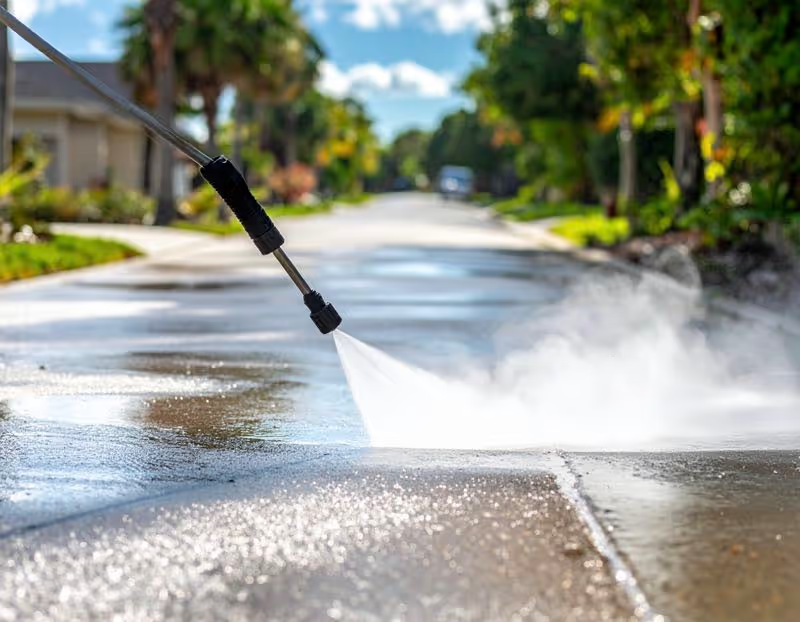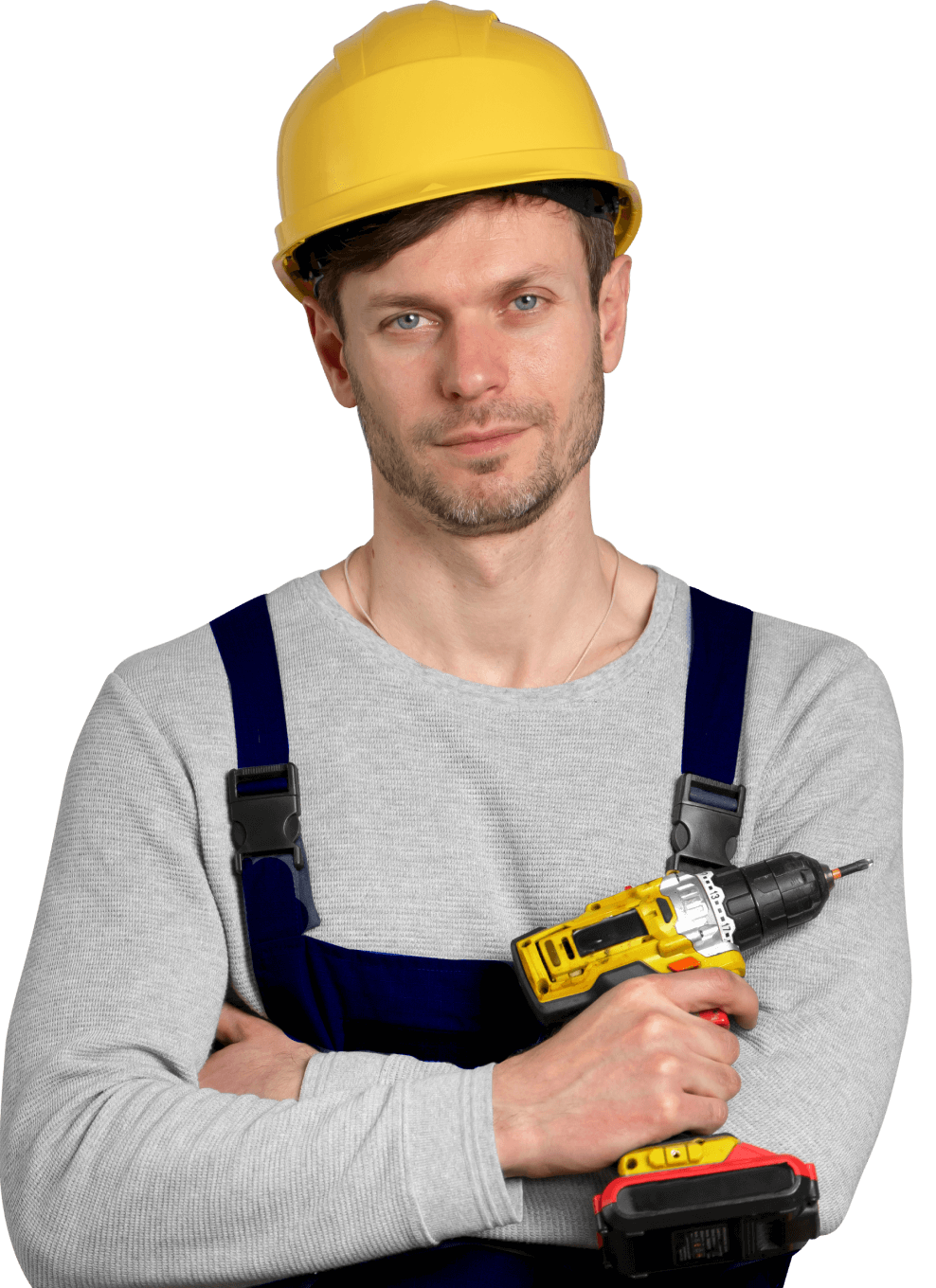
Hard Water Stain Removal in Orlando: Professional Pressure Washing That Restores Glass, Concrete & Surfaces
Hard water stain removal in Orlando tackles the stubborn white deposits and cloudy buildup from Central Florida's mineral-rich water, restoring clarity to windows, driveways, and exterior surfaces without causing damage.
Commercial cleaners remove hard water stains faster and safer than household products
Homeowners in Lake Nona and Winter Park dealing with cloudy pool enclosure glass face a frustrating reality. Property managers with stained storefront windows hear tenant complaints weekly. Commercial building owners watch mineral deposits accumulate on exterior glass while wondering if DIY solutions will work. The answer is almost always no—household products simply cannot match professional-grade descalers.
Professional-grade descalers dissolve years of mineral buildup in one treatment without repeated scrubbing, surface scratching, or the acetic acid smell that lingers from DIY vinegar methods. Walk through any hardware store and you will find bottles of CLR, vinegar solutions, and OxiClean promising to remove hard water stains. These products work marginally well on fresh deposits—the kind that appeared last week. They fail completely against the stubborn white haze that has been baking onto your lanai glass for the past two years.
Orlando's limestone aquifer produces water with 180-250 PPM hardness, classified as "very hard" by water quality standards. This mineral concentration requires stronger acidic solutions than household products provide for complete stain removal. Commercial descalers contain hydrochloric acid or phosphoric acid at concentrations calibrated specifically for dissolving calcium carbonate and magnesium deposits without etching glass or degrading concrete surfaces.
I have seen homeowners spend three weekends scrubbing their pool enclosure with vinegar and paper towels, achieving maybe 40% improvement. Then we treat the same surface with commercial descaler and low-pressure washing, restoring 95% clarity in ninety minutes. The difference comes down to chemistry. Household vinegar contains 5% acetic acid. Professional descalers use 8-15% hydrochloric acid formulations that break the molecular bonds holding minerals to glass surfaces.
The safety factor matters too. Homeowners mixing stronger acids without proper ventilation, protective equipment, or dilution ratios risk chemical burns, respiratory irritation, and accidental damage to landscaping or metal fixtures. Professional glass restoration specialists understand neutralization protocols, runoff management, and which surfaces require which chemical formulations. According to the Water Quality Association, hard water contains dissolved minerals that can cause scale buildup and staining on plumbing fixtures and surfaces, requiring specialized cleaning approaches for effective removal. We test pH levels during treatment, ensuring complete stain removal without creating new problems through improper chemical application.
Cost comparison reveals the value difference. Homeowners typically spend $40-80 on multiple bottles of consumer products, plus three to five hours of labor, achieving partial results. Professional service costs $150-300 for a standard home, delivers complete stain removal, and includes protective treatments that extend clarity for months. The time savings alone justify professional service for busy Orlando families juggling work schedules, family commitments, and the endless demands of Florida homeownership.


Pressure washing eliminates hard water buildup on glass and concrete without surface damage
Baldwin Park residents staring at stained driveway pavers know the frustration of mineral deposits that ordinary cleaning cannot touch. College Park homeowners dealing with cloudy lanai glass wonder if replacement is the only option. Dr. Phillips condo associations receive complaints about building-wide exterior window deposits from multiple unit owners. Pressure washing provides the mechanical force necessary to lift stubborn mineral buildup—when applied correctly.
Controlled low-pressure washing (under 1000 PSI for glass, 2000-3000 PSI for concrete) lifts mineral deposits after chemical treatment breaks molecular bonds, leaving surfaces clear without etching risk. The sequence matters critically. Chemical treatment comes first, breaking down the calcium and magnesium bonds that cement mineral deposits to surfaces. Then pressure washing provides the mechanical action to flush away dissolved minerals before they can re-bond.
I watched a homeowner in Windermere attempt DIY pressure washing on his lanai glass using a rented 3000 PSI unit from the hardware store. He started spraying before applying any chemical treatment, using full pressure directly on the glass panels. The result? Permanent etching that now requires complete glass replacement. The mineral stains remained, but he added visible scratch patterns that scatter light and reduce clarity even more than the original deposits. That mistake cost him $8,000 in glass replacement versus the $300 professional cleaning would have cost.
Florida's afternoon thunderstorms between June and October create constant evaporation cycles that bake mineral deposits onto surfaces, making mechanical removal necessary after chemical treatment alone fails. According to the U.S. Geological Survey, hard water contains high concentrations of dissolved minerals like calcium and magnesium that can accumulate on surfaces and require specialized removal techniques. Orlando receives 51 inches of rain annually, with 60% falling during the summer wet season. Every afternoon rain shower deposits minerals onto your exterior surfaces. Then the intense Florida sun evaporates the water within hours, leaving minerals bonded to glass, concrete, and tile. This cycle repeats daily, building layers of mineral deposits that become progressively harder to remove without mechanical action.
Surface preparation determines results quality. Professional services pre-rinse surfaces to remove loose dirt and organic debris before applying chemical descalers. This prevents dirt particles from scratching surfaces during pressure washing. We also protect surrounding areas—covering plants, moving furniture, and masking screen panels—before chemical application. These same meticulous preparation protocols apply to commercial and industrial window restoration, where facility managers need reliable results without disrupting operations. DIY attempts typically skip these preparation steps, leading to damaged landscaping, stained furniture, and torn screen material from misdirected pressure spray.
Different surfaces require different pressure settings and spray angles. Glass needs wide fan spray patterns at oblique angles to prevent direct force concentration. Concrete handles tighter spray patterns at more direct angles for deeper cleaning. Pavers require careful pressure control to avoid dislodging joint sand between stones. These technique variations come from experience and training that homeowners simply do not have. The pressure washer becomes a surgical tool in trained hands, removing exactly what needs removal while protecting everything else.
Hard water stains return quickly in Orlando without protective treatments after cleaning
Waterford Lakes homeowners tired of monthly glass cleaning ask us the same question repeatedly: "How long will this last?" Thornton Park business owners wanting lasting storefront clarity need solutions beyond temporary fixes. Property managers seeking reduced maintenance frequency across multiple Orlando locations calculate cost-effectiveness by service longevity, not initial price.
Post-cleaning sealants create hydrophobic barriers that cause water to bead and roll off glass and tile, extending clarity from 2-3 weeks to 4-6 months between professional treatments. The chemistry behind these protective coatings revolutionizes maintenance schedules for Orlando properties. Sealants bond to clean surfaces at the molecular level, creating an invisible barrier that prevents mineral deposits from attaching. Water droplets form beads that roll off surfaces rather than evaporating and leaving mineral residue.
I treated a Lake Nona home's pool enclosure glass without sealant application during my first year in business. The homeowner called three weeks later reporting stains had returned. I treated the same property eight months ago, this time including premium glass sealant after cleaning. The homeowner reported continued clarity six months later, finally calling for annual maintenance rather than monthly frustration. That sealant application cost an additional $150 but eliminated five service calls at $200 each.
Orlando's 51 inches of annual rainfall and 75% average humidity accelerate mineral redeposit rates, making protective coatings essential for cost-effective long-term stain prevention on exterior surfaces. According to Wikipedia, hydrophobic coatings create water-repellent surfaces by reducing surface energy, causing water to bead rather than spread and adhere to treated materials. The mathematics work against unprotected surfaces in our climate. Every rain event deposits minerals. Every day of 75%+ humidity keeps surfaces damp enough for mineral adhesion. Even morning dew contains dissolved minerals from atmospheric contact with Florida's limestone-heavy soil. Unprotected glass and concrete fight a losing battle against constant mineral exposure.
Coating durability depends on surface type and environmental exposure. South-facing glass receiving eight hours of direct sun daily may need retreatment every 4-5 months. North-facing surfaces under roof overhangs maintain protection for 8-12 months. Horizontal concrete surfaces with constant sprinkler exposure require more frequent reapplication than vertical walls. Professional assessment identifies which surfaces need which protection levels, optimizing cost-effectiveness across your entire property.
Application technique affects coating performance significantly. Surfaces must be completely clean and dry before sealant application. Temperature must be between 50-90 degrees Fahrenheit. Humidity below 70% ensures proper curing. These conditions exist in Orlando typically between November and April, making fall and winter the ideal seasons for protective treatment application. Summer's afternoon thunderstorms and high humidity create challenging application conditions that can reduce coating effectiveness or prevent proper bonding entirely.
Different surfaces need specific removal methods to avoid etching or discoloration
Windermere luxury homeowners with high-end finishes understand that their travertine pool deck requires different treatment than their neighbor's standard concrete. Commercial property managers responsible for mixed-material facades deal with glass curtain walls, stucco panels, aluminum trim, and concrete walkways—all showing hard water stains but each requiring distinct cleaning approaches. HOA boards protecting community asset values across Orlando neighborhoods need contractors who understand material science, not just pressure washing equipment operation.
Surface-specific protocols prevent permanent damage: gentle acidic cleaners for glass and aluminum, alkaline treatments for concrete and pavers, and pH-neutral solutions for natural stone and stucco. The chemistry knowledge separates professional services from equipment operators. Acidic cleaners dissolve mineral deposits effectively on glass but can etch natural limestone or travertine. Alkaline cleaners work well on concrete but leave residue on glass. Wrong chemical selection causes damage that costs far more than professional service would have cost initially.
I watched a property manager in Dr. Phillips hire the lowest-bid pressure washing company to clean hard water stains from a mixed-use building. The crew used straight hydrochloric acid on everything—glass windows, stucco walls, and decorative limestone trim. The windows came clean beautifully. The stucco developed permanent discoloration. The limestone trim now shows visible pitting that requires replacement. That $500 cleaning job created $15,000 in repair work because the crew lacked basic material knowledge.
Central Florida construction favors stucco exteriors and limestone-aggregate concrete that react badly to strong acids, requiring trained technicians who adjust chemical strength and pressure based on material porosity. Drive through any Orlando neighborhood and you will see stucco on 60-70% of homes. This textured cement-based coating provides excellent insulation and weather protection but contains calcium carbonate that dissolves when exposed to strong acids. Professional services use diluted acidic cleaners or pH-neutral alternatives on stucco, preventing the surface degradation that leaves permanent white spots and texture loss.
Natural stone surfaces—travertine, limestone, marble—require the gentlest treatment approaches. These materials are themselves calcium carbonate formations, making them vulnerable to any acidic cleaning solution. pH-neutral enzymatic cleaners or alkaline treatments work slowly but safely on natural stone. Pressure must stay below 1000 PSI to avoid surface erosion or grout displacement. Many luxury Orlando homes feature natural stone pool decks, walkways, and accent walls that require specialized knowledge for safe cleaning.
Glass types vary in mineral deposit removal requirements as well. Tempered glass common in doors and large windows handles standard treatments well. Laminated glass in some commercial applications may delaminate if harsh chemicals seep into edge seals. Low-e coated glass for energy efficiency can lose coating integrity when cleaned with wrong chemicals or excessive pressure. Professional services identify glass types before treatment, adjusting methods to protect specialty glazing while removing mineral deposits.
Metal surfaces—aluminum window frames, stainless steel railings, bronze fixtures—each react differently to cleaning chemicals. Aluminum oxidizes rapidly when exposed to strong alkaline cleaners, creating permanent white corrosion. Stainless steel tolerates most cleaners but can pit when exposed to undiluted hydrochloric acid. Bronze and copper develop green patina when acidic cleaners remain in contact too long. We test cleaning solutions on inconspicuous areas before full application, preventing expensive fixture damage from chemical incompatibility.
Professional equipment reaches second-story windows and large commercial glass areas homeowners cannot access
Two-story home owners in Dr. Phillips looking at cloudy second-floor windows face a significant access challenge. Downtown Orlando high-rise property managers receive complaints about visible mineral streaking from street level. Commercial facility operators with expansive glass curtain walls or skylights watch mineral deposits accumulate on surfaces thirty feet above ground level, knowing replacement would cost hundreds of thousands of dollars.
Water-fed poles (up to 60 feet), lift equipment, and commercial pumps deliver cleaning solution and rinse water to unreachable areas while maintaining safe ground-level operation for technicians. The equipment investment required for high-access cleaning exceeds most homeowners' budgets and storage capacity. A professional-grade water-fed pole system costs $3,000-5,000. Aerial lift rental runs $400-600 per day. Commercial pressure washing pumps with sufficient vertical lift capacity cost $2,000-4,000. These tools sit essential for proper high-elevation cleaning but make no economic sense for one-time homeowner use.
I worked a Lake Nona commercial building with 25-foot glass panels flanking the main entrance. The property manager previously hired a company that attempted cleaning with a 20-foot extension pole and garden hose pressure. They reached maybe 18 feet up, leaving visible streaks across the top seven feet of each panel. We brought a 40-foot water-fed pole system with dedicated purified water supply. Complete cleaning took four hours versus the previous company's two-day partial effort. The building management switched to quarterly maintenance after seeing results that actually addressed the entire surface.
Orlando building codes and insurance requirements prohibit untrained individuals from using ladders above 12 feet or working on commercial roofs, making licensed pressure washing services the only legal option for tall structures. The liability exposure from high-elevation cleaning attempts explains why professional licensing and insurance matter so critically. Fall from heights regulations under OSHA require specific safety equipment, training documentation, and insurance coverage levels. Homeowners attempting second-story window cleaning with basic ladders violate no laws until they fall and create insurance claims or medical bills. Commercial property owners face legal liability for allowing unlicensed contractors to work at height on their properties.
Equipment sophistication matters beyond simple height access. Water-fed poles use purified water—zero dissolved minerals—that dries spot-free without wiping. This matters crucially for high windows where physical drying becomes impractical. The purification systems remove all minerals through reverse osmosis or deionization, producing water that rinses away mineral deposits and evaporates without leaving any residue. Ordinary tap water would simply redistribute minerals across cleaned surfaces, defeating the entire purpose of professional treatment.
Commercial pumps provide consistent pressure and flow rate necessary for uniform cleaning across large surface areas. Homeowner-grade pressure washers cycle on and off, creating pressure variations that produce streaky results. They also lack the volume capacity needed for extensive projects—a 2-gallon-per-minute homeowner machine would require 10 hours to deliver the same water volume as a 5-gallon-per-minute commercial unit provides in 4 hours. Time efficiency translates directly to cost-effectiveness for large properties.
Safety equipment standards protect both workers and property. Professional services use fall protection harnesses when working above 6 feet, non-marring stabilizers on ladders and poles to prevent surface damage, and proper electrical grounding for equipment near building panels and fixtures. These safety protocols reduce accident risk dramatically while preventing the property damage that occurs when untrained operators drop equipment, lean ladders against fragile trim, or drag hoses across decorative landscaping.
Frequently Asked Questions About Hard Water Stain Removal in Orlando
How long does professional hard water stain removal take in Orlando?
Most residential homes with standard lanai and exterior glass complete in 2-4 hours, depending on stain severity and surface area. The process involves pre-treatment with chemical descalers, controlled pressure washing, and optional protective sealant application. We work efficiently while ensuring thorough coverage of all affected surfaces. Commercial buildings schedule by square footage during off-peak business hours to minimize disruption to daily operations—typically evening or weekend appointments for retail locations and early morning for office buildings.
Will hard water stain removal damage my pool enclosure screen?
No—we mask all screen panels before applying chemical treatments and use only screen-safe low-pressure rinse settings under 100 PSI. Screens represent the most delicate component of pool enclosures, easily torn by high pressure or degraded by harsh chemicals. Our technicians protect screens with plastic sheeting secured with low-tack tape that removes cleanly without residue. Chemical solutions stay below pH levels that would damage screen fiber or oxidize aluminum frames. We have treated thousands of Orlando pool enclosures without a single screen damage claim because proper masking and pressure control eliminate risk entirely.
Do I need to be home during hard water stain cleaning in Orlando?
Not required for exterior-only work—we perform pre-service walkthroughs and text progress photos, with payment processed after you approve final results. Many Orlando homeowners schedule service during work hours, receiving text updates showing before, during, and after photos. We access exterior surfaces through yard gates rather than requiring interior home entry. Final walk-through happens on your schedule, either same-day when you return home or next-day during a brief site visit. We accept payment via credit card over phone or through emailed invoice, making the entire process convenient for busy property owners who value time over on-site supervision.
How soon after cleaning will hard water stains come back on my Orlando home?
Without sealant, expect 3-6 weeks before visible staining reappears, depending on sun exposure and water contact frequency. With protective coating, clarity extends 4-6 months before maintenance becomes necessary. Reapplication timing depends on several factors: south-facing surfaces receiving direct afternoon sun experience faster coating degradation than shaded north-facing areas. Surfaces directly hit by sprinkler spray require more frequent maintenance than protected areas. Pool splash zones show staining sooner than perimeter sections. We provide specific maintenance schedules based on your property's unique exposure patterns and usage.
Can you remove hard water stains from my driveway and sidewalk at the same time?
Yes—we typically bundle concrete surface cleaning with glass treatment since equipment setup and chemical application processes overlap for efficient same-visit service. Most residential properties benefit from comprehensive exterior cleaning rather than addressing only one surface type. Driveway concrete usually shows the same mineral deposits as your lanai glass, just in different visual patterns. Sidewalk sections bordering irrigated lawn areas develop heavy staining from constant sprinkler overspray. Bundling services reduces per-surface cost, minimizes appointment scheduling hassle, and ensures your entire property achieves consistent clean appearance rather than having some surfaces spotless while others remain stained.
What's the best season to schedule hard water stain removal in Orlando?
November through April (dry season) provides longest-lasting results due to reduced rain frequency and lower humidity levels ideal for protective sealant application. Florida's wet season from June through October brings daily afternoon thunderstorms that accelerate mineral redeposition rates. Dry season scheduling allows protective coatings to cure properly without rain interference within the critical first 24-48 hours after application. Cooler temperatures during winter months also slow coating degradation from UV exposure. That said, we provide year-round service because hard water stains cause ongoing property appearance issues regardless of season. Wet season appointments require immediate sealing or acceptance of shorter clarity duration between maintenance visits.
Professional Hard Water Stain Removal Protects Your Orlando Property Investment
Hard water stains do more than reduce curb appeal—they permanently etch glass, degrade concrete, and signal property neglect to neighbors, guests, and potential buyers. Orlando's mineral-rich water and humid climate make professional treatment essential rather than optional for protecting your investment. We combine commercial-grade chemical descalers, controlled pressure washing technique, and protective sealants that address both immediate stain removal and long-term prevention.
Contact Pressure Washing Guys for fast, safe hard water stain removal that restores clarity to glass, concrete, and all exterior surfaces. Call (407) 412-4015 or visit pressurewashingguysflorida.com for same-day quotes and next-day service availability. Serving Winter Park, Lake Nona, Dr. Phillips, Windermere, Baldwin Park, and the entire metro Orlando area with equipment and expertise designed specifically for Florida's unique climate challenges.


Get a quote within an hour for your project!
Our team responds fast so you can start your project
without delays or guesswork.

